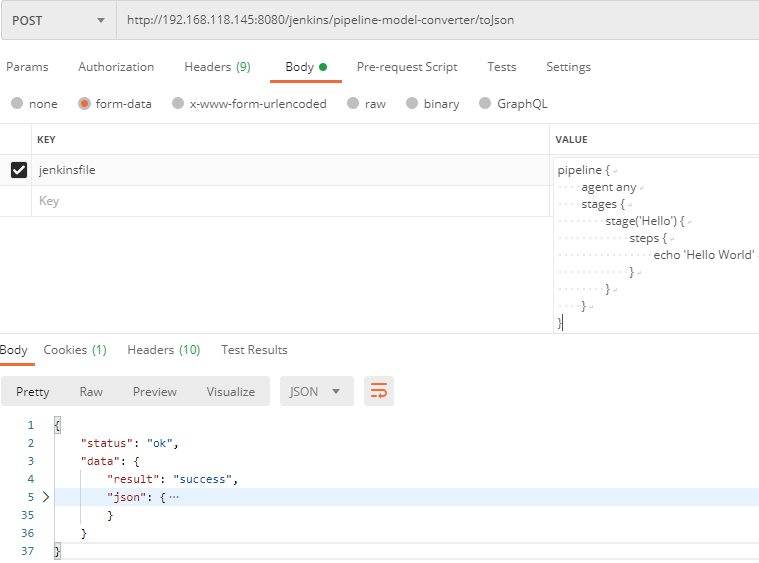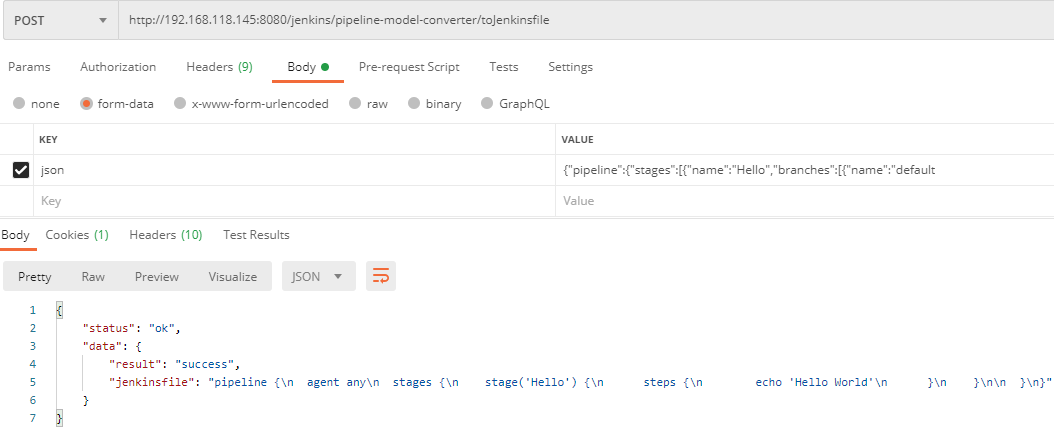jenkins:实现Jenkinsfile与Json的转换
实现Jenkinsfile与Json的转换
最近在做个需求,需要支持Jenkinsfile和json的转换。
方法1:使用现有的jenkins插件
参考的是这篇文章。下面介绍一下将插件打包成镜像的步骤:
-
本地安装jdk和maven,jdk建议采用的版本为8(该工程会依赖一个名为
tools.jar的包,jdk 9之后移除了该包)如果本地没有找到
tools.jar,可以下载一个1.8版本的jdk,然后在pom.xml中增加如下依赖<dependency> <groupId>jdk.tools</groupId> <artifactId>jdk.tools</artifactId> <version>1.8.0</version> <scope>system</scope> <systemPath>/root/jdk1.8.0_271/lib/tools.jar</systemPath> </dependency> -
clone pipeline-model-definition-plugin工程
-
在/root/.m2/目录下创建
settings.xml,内容来自Jenkins官方:<settings> <pluginGroups> <pluginGroup>org.jenkins-ci.tools</pluginGroup> </pluginGroups> <profiles> <!-- Give access to Jenkins plugins --> <profile> <id>jenkins</id> <activation> <activeByDefault>true</activeByDefault> <!-- change this to false, if you don't like to have it on per default --> </activation> <repositories> <repository> <id>repo.jenkins-ci.org</id> <url>https://repo.jenkins-ci.org/public/</url> </repository> </repositories> <pluginRepositories> <pluginRepository> <id>repo.jenkins-ci.org</id> <url>https://repo.jenkins-ci.org/public/</url> </pluginRepository> </pluginRepositories> </profile> </profiles> <mirrors> <mirror> <id>repo.jenkins-ci.org</id> <url>https://repo.jenkins-ci.org/public/</url> <mirrorOf>m.g.o-public</mirrorOf> </mirror> </mirrors> </settings> -
执行
mvn install进行编译 -
由于主要用到的是Jenkinsfile和json之间的转换关系,因此主要用的是如下两个REST API:
-
Conversion to JSON representation from Jenkinsfile
- URL:
JENKINS_URL/pipeline-model-converter/toJson - Parameters:
jenkinsfile- theJenkinsfilecontents - Info: Takes a
Jenkinsfileand converts it to the JSON representation for itspipelinestep. - Returns: JSON with a
resultfield that will either besuccessorfailure. Ifsuccess, the JSON representation will be in thejsonfield. Iffailure, there'll be an additional array in theerrorsfield of the error messages encountered.
- URL:
-
Conversion to Jenkinsfile from JSON representation
- URL:
JENKINS_URL/pipeline-model-converter/toJenkinsfile - Parameters:
json- the JSON representation of the model - Info: Takes the JSON representation of the model and converts it to the contents for a
Jenkinsfileinvoking thepipelinestep. - Returns: JSON with a
resultfield that will either besuccessorfailure. Ifsuccess, theJenkinsfilecontents will be in thejenkinsfilefield. Iffailure, there'll be an additional array in theerrorsfield of the error messages encountered.
- URL:
上述两个API在
pipeline-model-definition-plugin/pipeline-model-definition目录下,因此在该目录下直接运行:mvn hpi:run -Dhost=0.0.0.0 -Djetty.port=8080即可。 -
-
将json转换为Jenkinsfile的操作如下:
![]()
完整的返回值如下:
{ "status": "ok", "data": { "result": "success", "json": { "pipeline": { "stages": [ { "name": "Hello", "branches": [ { "name": "default", "steps": [ { "name": "echo", "arguments": [ { "key": "message", "value": { "isLiteral": true, "value": "Hello World" } } ] } ] } ] } ], "agent": { "type": "any" } } } } } -
将Jenkinsfile转换为json的操作如下
![]()
-
制作容器镜像时,只需要将本地工程和
/root/.m2上传到容器,生成对应的镜像即可,下面Dockerfile假设生成的镜像为pipeline-model-definition-plugin:latestFROM pipeline-model-definition-plugin:latest WORKDIR /usr/pipeline-model-definition-plugin/pipeline-model-definition ENV PATH=$PATH:/usr/local/bin/maven-3.6.3/bin ENTRYPOINT ["sh", "-c", "mvn hpi:run -Dhost=0.0.0.0"]我自己打包了一个镜像:
docker pull quay.io/woodliu/pipeline-model-definition-plugin
需要注意的是,本插件提供的转换API toJenkinsfile和toJson并不是万能的,只能支持jenkins标准的参数类型,例如对于gitParameter这样的参数就无法解析(扩展功能),一种解决方式是独立解析扩展的参数,然后将其插入解析好的标准JenkinsFile中;另外一个方式就是写一个jenkinsfile的解析器。
参考
-
mvn hpi的命令可以参考官方文档
-
可以运行
mvn hpi:hpi生成对应的hpi文件,如:/pipeline-model-definition-plugin/pipeline-model-definition/target/pipeline-model-definition.hpi
方法2:解析原生的jenkinsfile文件
在GitHub上有一个支持jenkinsfile解析的项目,该项目使用rust的pest crate来编写jenkinsfile的语法,支持对jenkinsfile的格式验证。Pest官方文档中给出了一个非常好的对json语法的解析例子,主要是使用递归的方式来解析语法。
pest官方提供了一个编辑器,可以使用该编辑器查看经过pest解析之后的字段,对了解pest的工作方式非常有用。如,使用jdp项目提供的pest文件解析如下jenkinsfile:
pipeline {
agent {
docker {
reuseNode true
image 'maven:3-alpine'
label 'my-defined-label'
args '-v /tmp:/tmp'
registryUrl 'https://myregistry.com/'
registryCredentialsId 'myPredefinedCredentialsInJenkins'
}
}
stages {
stage('Build') {
steps { sh 'make' }
}
}
}
对应的解析结果如下:
- preceeding_junk: ""
- opening_brace: "{"
- agentDecl > agentBlock
- opening_brace: "{"
- dockerAgent
- opening_brace: "{"
- bool: "true"
- string > single_quoted
- single_quote: "\'"
- inner_single_str: "maven:3-alpine"
- single_quote: "\'"
- string > single_quoted
- single_quote: "\'"
- inner_single_str: "my-defined-label"
- single_quote: "\'"
- string > single_quoted
- single_quote: "\'"
- inner_single_str: "-v /tmp:/tmp"
- single_quote: "\'"
- string > single_quoted
- single_quote: "\'"
- inner_single_str: "https://myregistry.com/"
- single_quote: "\'"
- string > single_quoted
- single_quote: "\'"
- inner_single_str: "myPredefinedCredentialsInJenkins"
- single_quote: "\'"
- closing_brace: "}"
- closing_brace: "}"
- stagesDecl
- opening_brace: "{"
- stage
- string > single_quoted
- single_quote: "\'"
- inner_single_str: "Build"
- single_quote: "\'"
- opening_brace: "{"
- stepsDecl
- opening_brace: "{"
- step > simple_step
- IDENT: "sh"
- args > string > single_quoted
- single_quote: "\'"
- inner_single_str: "make"
- single_quote: "\'"
- closing_brace: "}"
- closing_brace: "}"
- closing_brace: "}"
- closing_brace: "}"
- ending_junk: ""
- EOI: ""
Pest语法重点标注:
当使用静默规则时,解析结果中将不会出现该规则字段。当解析下面规则时,解析结果中将不会存在silent,即
parsed.as_rule()中不会存在silentsilent = _{ ... }当使用原子语法时,整个规则体将视为一个规则,如double_quoted = ${ (quote ~ inner_double_str ~ quote) },在解析时会将
quote ~ inner_double_str ~ quote视为一个规则,而不是三个。这有利于获取一段完整的字符串。atomic = @{ ... } compound_atomic = ${ ... }
我尝试使用该项目解析jenkinsfile,但发现实现起来太过复杂,且rust和jenkinsFile的语法也是一言难尽。如下,当step中带括号和不带括号混用时会导致解析错误。
steps {
echo 'test'
dir('command') {
sh "sh ./saas.sh ${params.channel} ${params.buildType} "
}
}
有精力的大神可以在此基础上实现解析JenkinsFile的功能。
参考
- pest文档
本文来自博客园,作者:charlieroro,转载请注明原文链接:https://www.cnblogs.com/charlieroro/p/14301878.html







 浙公网安备 33010602011771号
浙公网安备 33010602011771号